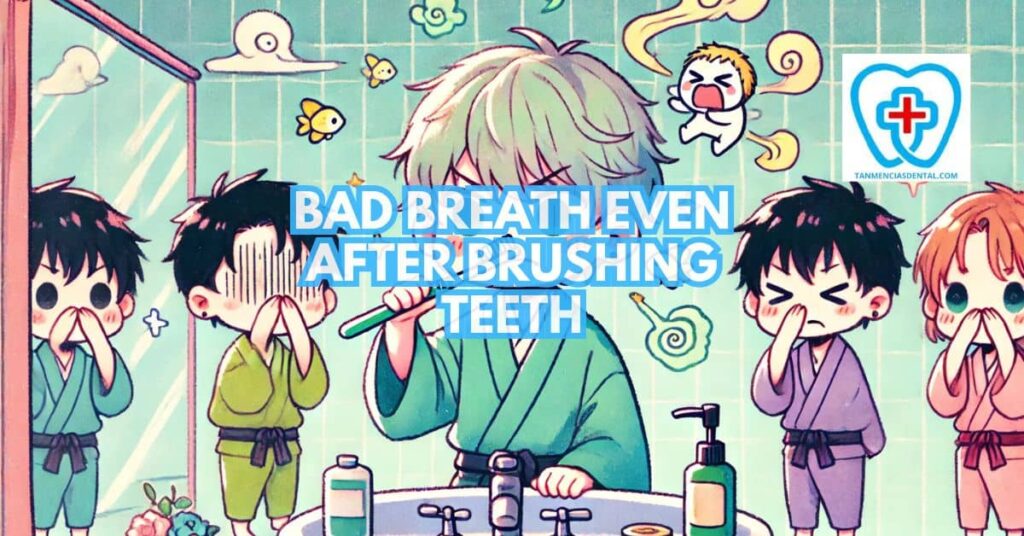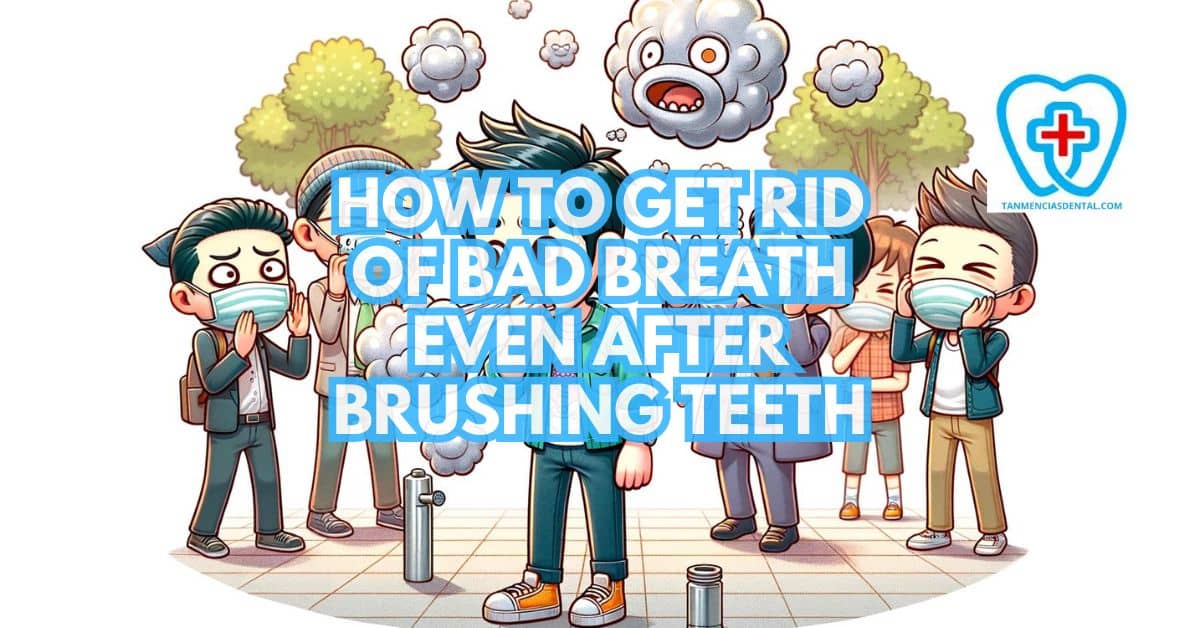Bad breath even after brushing teeth can be frustrating and embarrassing, but it’s more common than you might think.
This issue often stems from causes that brushing alone doesn’t solve, such as lingering bacteria, dry mouth, or certain foods.
To tackle it effectively, you need a more complete oral care routine, including flossing, tongue cleaning, and staying hydrated.
Understanding what triggers persistent bad breath is key to finding the right solution.
With the right habits, you can enjoy fresher breath and better oral health.
1. Master the Brush: Brushing Technique Makes a Difference
Effective brushing is about more than just moving the toothbrush around your teeth; it’s about using the right tools and methods to protect your oral health.
Start with a toothbrush that has soft bristles to avoid irritating your gums, which can help prevent gum disease, a major cause of halitosis.
Focus on cleaning each tooth individually, using small, circular motions along the gum line and chewing surfaces.
Don’t forget to brush the back molars, as these are common spots for food particles and bacteria to hide.
Replace your toothbrush every three to four months, or sooner if the bristles become worn, as old brushes are less effective.
Brushing correctly not only reduces bad breath but also helps prevent more serious health conditions, like infections linked to poor oral hygiene.
Mastering this simple routine is a key step toward keeping your mouth healthy and fresh.
🦷 Can a Broken Tooth X-Ray Show More Than Just the Obvious Damage?
2. Flossing: Don’t Let Food Particles Hide Between Your Teeth
Flossing is essential for keeping your teeth and gums healthy by removing food particles and plaque from areas your toothbrush can’t reach.
These hidden bits of food can feed the bacteria in your mouth, leading to tooth decay and gum disease if not cleaned out regularly.
To floss effectively, use about 18 inches of floss, wrapping most around one finger and the rest around another for good grip.
Gently slide the floss between your teeth, using a rubbing motion, and curve it into a “C” shape around each tooth to clean both sides thoroughly.
Make sure to floss beneath the gum line without snapping or forcing it, as this can irritate your gums.
Flossing at least once a day, preferably before brushing, ensures that toothpaste can reach and protect these cleaned areas more effectively.
This routine not only helps prevent cavities but also reduces the risk of bad breath and other serious oral health problems.
🦷 How Do Dentists Figure Out If You Need Braces?
3. Beyond Brushing: Include Your Tongue in Your Cleaning Routine
The tongue can harbor a significant amount of bacteria that produce foul odors, contributing to bad breath.
Each day, use a tongue scraper or the bristles of your toothbrush to clean the surface of your tongue thoroughly.
Start at the back of the tongue and move forward, scraping or brushing gently but effectively.
This removes the mucous layer and bacteria that accumulate on the tongue’s surface.
Including your tongue in your daily cleaning routine can have a profound impact on maintaining fresher breath.
🦷 Are Dentists Open on Weekends? Why Weekend Hours Are a Game-Changer for Busy People
4. H2O to the Rescue: Stay Hydrated for a Fresher Mouth
Staying hydrated is a simple yet effective method to combat bad breath.
Water helps rinse away food particles and bacteria that can lead to bad odors.
It also stimulates saliva production, which is natural protection against bad breath as it neutralizes acids and washes away bacteria.
Make a habit of sipping water throughout the day, especially after meals.
Keeping your mouth moist reduces the growth of bacteria that cause bad breath.
🦷 What Kinds of Diseases Can You Get From Skipping Your Toothbrush?

5. Mind Your Menu: Certain Foods Can Pack a Breath Punch
Some foods are notorious for causing bad breath, such as garlic, onions, and strong spices, which can linger in the mouth and be expelled through the breath long after they are consumed.
To minimize their impact, try to eat these foods in moderation and brush your teeth or chew sugar-free gum after consuming them.
Additionally, foods like apples, carrots, and celery can help clean your teeth naturally due to their high fiber content, acting as natural breath fresheners.
Dairy products can neutralize garlic and onion odors, so consider ending a meal with cheese or yogurt.
Balancing your diet not only affects your general health but also helps maintain better breath quality.
🦷 How to Find a Budget-Friendly Oral Surgeon Without Sacrificing Good Care
6. Kick the Habit: Smoking is Detrimental to Fresh Breath
Smoking cigarettes or cigars or using other tobacco products significantly affects oral health and is a common cause of bad breath.
Tobacco smoke lingers in the mouth, sticks to the oral tissues, and reduces saliva flow, which is necessary to cleanse the mouth and remove particles that cause bad smells.
Quitting smoking can dramatically improve the freshness of your breath and your overall oral health, reducing the risk of gum disease and mouth cancer.
Many resources are available to help with quitting, including nicotine patches, gums, and support groups.
Healthier alternatives to smoking, like nicotine lozenges or inhalers, can also aid in the transition and improve breath odor.
🦷 What Tools Do Dentists Actually Use to Clean Your Teeth?
7. Mouthwash: A Refreshing Boost, Not a Replacement
While mouthwash can offer a temporary fix by masking bad breath with a fresh scent, it’s not a substitute for thorough brushing and flossing.
Choose an alcohol-free mouthwash, as alcohol can dry out your mouth and potentially worsen bad breath over time.
Look for mouthwashes that contain chlorine dioxide or zinc, which are more effective in neutralizing the compounds that cause bad breath.
Use mouthwash as part of a comprehensive oral hygiene routine that includes brushing and flossing.
Remember, mouthwash is best used as an additional measure, not the sole treatment for bad breath.
🦷 The Top Things Parents Should Look for in a Kid-Friendly Dentist
8. Regular Dental Checkups: Prevention is Key
Regular dental checkups and cleanings are essential for maintaining oral health and preventing conditions that cause bad breath.
A dentist can remove plaque and tartar buildup that regular brushing and flossing can’t, which, if left untreated, can lead to periodontal disease and chronic bad breath.
Dental visits are also an opportunity for professionals to spot early signs of problems that could contribute to bad breath, such as cavities and gum diseases.
Typically, it is recommended to visit the dentist every six months for a checkup.
Establishing a regular dental routine will help prevent dental issues and keep your breath fresh.
🦷 Can You Brush Your Teeth With Just Your Fingers?
9. Beyond the Mouth: Consider Underlying Medical Conditions
Bad breath can sometimes signal health problems beyond the mouth, including sinus infections, gastrointestinal disorders, or chronic conditions like diabetes.
Sinus infections and postnasal drip can cause a buildup of mucus, which serves as a breeding ground for bacteria that produce foul odors.
Similarly, issues like GERD or acid reflux allow stomach acid to travel up the esophagus, causing a sour or unpleasant smell.
Chronic conditions such as diabetes can also affect breath by altering the body’s metabolism, leading to a fruity or acetone-like odor.
If you brush and floss twice a day but still struggle with bad breath, it’s important to seek medical advice to identify potential underlying issues.
Addressing these health problems not only improves your breath but also supports your overall well-being.
Early detection and treatment of these conditions can make a big difference in managing both your health and your confidence.
🦷 How Getting Full Dental Care Can Actually Help Your Overall Health
10. How Medications Can Cause Bad Breath
Some medications can make your mouth feel dry, which can lead to bad breath.
When your mouth is dry, there isn’t enough saliva to wash away bacteria and food particles.
Common medicines that cause dry mouth include antihistamines, antidepressants, and blood pressure drugs.
These bacteria produce odors that make your breath smell unpleasant.
If you notice bad breath after taking certain medications, talk to your doctor about possible alternatives or ways to keep your mouth moist.
🦷 The Right Way to Brush Your Teeth: A Simple Guide to a Better Smile
11. Dry Mouth Solutions: Keep Your Mouth Moist for Freshness
Dry mouth, medically known as xerostomia, can significantly contribute to bad breath by reducing saliva production necessary to cleanse the mouth and remove particles that cause foul odors.
To combat dry mouth, increase your fluid intake, chew sugar-free gum to stimulate saliva production, and avoid caffeinated beverages that can dehydrate you.
There are also over-the-counter saliva substitutes and oral moisturizers that can help keep your mouth moist.
Avoiding alcohol-based mouthwashes can also prevent further drying of the mouth tissues.
Consult your dentist for specific treatments that can help manage dry mouth effectively.
👨⚕️ Conclusion
Successfully managing bad breath requires a multi-faceted approach that includes proper oral hygiene, regular dental checkups, and attention to diet and lifestyle.
By understanding the various causes of bad breath and addressing them with specific strategies, you can significantly improve the freshness of your breath.
Incorporating daily practices such as thorough brushing, flossing, hydrating, and routine dental visits will greatly aid in maintaining oral health.
For persistent bad breath, consider consulting a healthcare professional to explore the possibility of underlying medical conditions.
Remember, a fresh breath is a sign of good health and can boost your confidence in social and professional settings.
😊 Self-Promotion
Visit us at Tan-Mencias Dental Clinic in Parang, Marikina City, where your smile and dental health are our top priorities!
Our friendly team is dedicated to providing you with the best dental care in a welcoming environment.
For any questions or to schedule an appointment, feel free to call us at 9171451074, send us a message through our Facebook page, or use the contact form on our website.
We’re here to assist with all your dental needs and ensure you leave our clinic smiling brighter.
Choose Tan-Mencias Dental Clinic for a healthier, more confident you!

